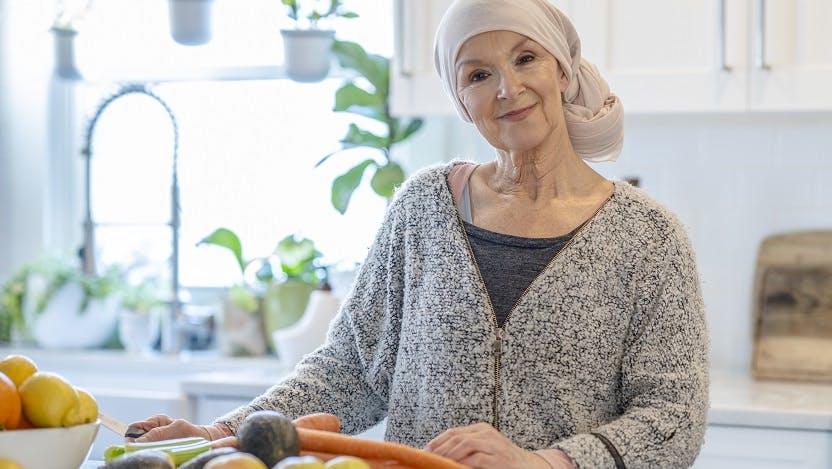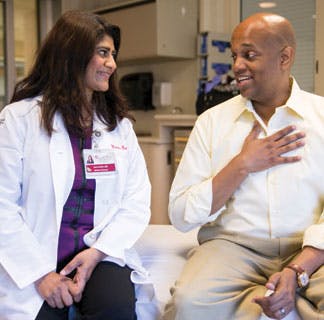How nutrition can support health during cancer treatment

Combating symptoms associated with cancer treatment is a common challenge for patients. Often, side effects of chemotherapy or radiation may result in changes to appetite and taste, but these changes can be managed with appropriate dietary support. Additionally, preventing malnutrition can be a key factor in improving cancer treatment outcomes. University of Chicago Medicine oncology dietitians Jeffrey Whitridge, MS, RDN, CSO, LDN, and Wendy Arnold, RD, CSO, LDN, discuss common strategies for nutrition support throughout the course of cancer treatment and recovery.
Nausea: a common enemy
Nausea is a frequently observed side effect to cancer treatment, but there are multiple strategies patients can use to treat nausea. Whitridge recommends starting with the medications prescribed to reduce nausea.
“Some can make you sleepy and some can keep you awake to do the rest of your day,” so he makes sure patients know when to use each medication.
Drinking water and eating small amounts of dry foods, such as cereal or toast, can help reduce the feelings of nausea. An empty stomach can actually make nausea worse, so both Arnold and Whitridge say it's important to eat small frequent meals. Arnold frequently suggests trying ginger teas, which can provide hydration in addition to reducing symptoms.
“Ginger is a natural anti-nauseant, so that is something easy patients can do at home," she said.
Staying hydrated
A common concern for doctors and dietitians is preventing dehydration, which can occur due to cancer treatments or their side effects. Drinking water is important, of course, but it is not the only strategy for improving hydration. Broths, herbal teas, and fruits — such as watermelon or grapes — can all contribute to daily fluid intake. As a bonus, they can be more enjoyable than drinking water alone.
Protein is key
While patients may experience decreased appetite due to treatment, increasing the amount of protein in the diet is important for recovery.
“There are increased protein needs with tissue rebuilding and healing,” Arnold said.
Protein is a necessary component for many body functions, but it is especially important for repairing damaged tissues after surgery or radiation. Additionally, protein is needed to restore blood counts, which may be decreased due to some cancer treatments.
Making food more enjoyable
Some chemotherapies can cause foods to have an unpleasant aftertaste, called dysgeusia. However, sour foods can help override this side effect.
Whitridge suggests adding lemon to water or eating pickles and vinegar-based foods. Strong, spicy flavors can also help distract from any unpleasant tastes.
Alternating these more pleasant flavors with bites of nutritious, high-protein foods can be an effective strategy for patients.
“You can kind of go back and forth between something that doesn’t taste so good with something that is a little more rewarding to get through a meal,” Arnold said.
Dietary support at UChicago Medicine
Whitridge and Arnold both work directly with patients during their cancer treatment at the UChicago Medicine Comprehensive Cancer Center. Whitridge sees Surgical Oncology patients at the health system's Hyde Park campus, while Arnold works with outpatient chemotherapy and radiation patients at UChicago Medicine Orland Park.
Dietitian support is currently available to UChicago Medicine cancer patients at no additional cost, and follow-ups can be scheduled for any patient who may need additional monitoring to prevent malnutrition.
Whitridge and the rest of the oncology dietitian team are passionate about helping patients thrive through their treatment.
“We know that we can make their treatment easier," he said.

UChicago Medicine Comprehensive Cancer Center
UChicago Medicine is designated as a Comprehensive Cancer Center by the National Cancer Institute, the most prestigious recognition possible for a cancer institution. We have more than 200 physicians and scientists dedicated to defeating cancer.
Learn More About the Comprehensive Cancer Center